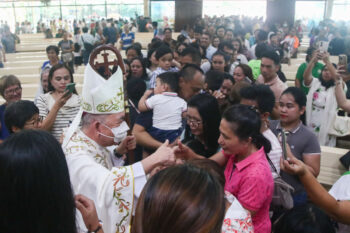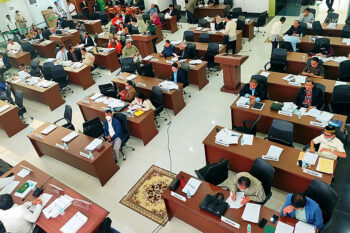The Long Tortuous Road to Peace and Bangsamoro Self-Determination
The journey to peace in Southern Philippines has been arduous and tedious, at times hostile and adversarial, replete with stops and punctuated by intermittent warfare and all out war. But at other times, the journey was collaborative, infused with mutual trust, slowly reaching the final steps — the 10 Decision Points on Principles, the Framework Agreement on the Bangsamoro (FAB), later the Comprehensive Agreement on the Bangsamoro (CAB) and finally the proposed Bangsamoro Basic Law (BBL).
And both sides, the Government (GPH) and the Moro Islamic Liberation Front (MILF), with a pervading sense of the common good of all Filipinos, passionately contested every provision of the BBL.
For more tan 17 years both peace panels with changes of personnel, persistently pursued peace.
World and local history has repeatedly shown how no one can quell a rebellion for self-determination by guns. When victory seems to have been won, the aspiration for self-determination lives on and will once again erupt into armed conflict.
Such is the nature of the Bangsamoro aspiration for self-determination which no successive regimes, colonial, Spanish, American, or Filipino, could slay.
Three Major Socio-Political and Moral Principles of Peace Negotiations
At the center of 17 years of peace negotiation are three major major socio-political and moral and principles:
- the preservation of national sovereignty,
- the safeguarding of national territorial integrity,
- and the realization of self-determination for the Bangsamoro.
The BBL is firmly rooted on these three major principles.
Towards this goal of self-determination the MILF had to explicitly give up and sacrifice its original identity as a separatist movement and become the Bangsamoro voice to be part and parcel of the Republic of the Philippines.
Fundamentally, peace negotiators, with legal and constitutional partners, meticulously strove to articulate the various provisions in such a way:
- that the provisions are constitutional;
- that the self-determination granted is not a first step towards secession;
- and that the autonomy of the Bangsamoro would be more than what has been granted by the Organic Act that created the Autonomous Region of Muslim Mindanao (ARMM).
The principles of subsidiarity and solidarity now enshrined in the Constitution together with the principle of devolution of power governs the asymmetrical relationship between the proposed regional Bangsamoro autonomous government and the national government.
On the Crossroad of History: the Peacemaking Role of Legislators
Our legislators are in the enviable position to crown 17 years of peacemaking with the approval of the BBL.
To my mind, they are not only legislators. Regarding the BBL their legislative role is eminently one of peacemaking.
They can either ignore the painstaking achievement of 17 years of peacemaking by emasculating the BBL in such a way that the aspiration of self-determination becomes once more a hollow dream. Or they can strengthen the BBL, refining its letter and preserving its spirit, such that the issues of constitutionality, national sovereignty, territorial integrity, devolution of power, the nature of a regional autonomous region, the rights of Indigenous Peoples and Christian minorities, as well as peoples of other faiths, and other issues, are resolved.
The BBL will not solve all the problems of criminality and lack of peace. It will not end all armed conflict due to rido or land disputes. Small groups will continue to fight for secession. But the BBL is the alternative for the greatest majority of the Bangsamoro and for our own military and security forces who are tired of war. It is the alternative to radicalization and extremism now spreading towards Southeast Asia and creeping into our shores.
The Lord of history has brought us to a crossroad on the journey to a just and lasting peace. The crossroad is akin to the scriptural crossroad. One way leads to death. The other leads to life.
To approve a BBL that is lesser than the Organic Act of the ARMM and falls short of self-determination as liberally granted by the Constitution is to perpetuate social injustice and human underdevelopment.
To approve a BBL, strengthened by legislative wisdom, and preserving substantively the letter and spirit of the proposed BBL leads to social justice, peace and human development.
(MindaViews is the opinion section of MindaNews.
PeaceTalk is open to anyone who wishes to share his / her piece on peace in Mindanao. Cardinal Orlando B. Quevedo, OMI is Archbishop of Cotabato and lead convenor of Friends of Peace).







